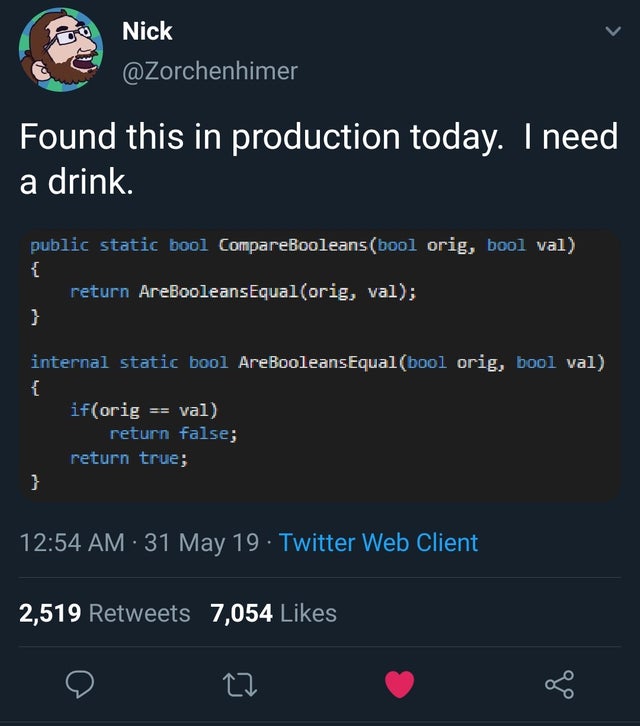Ranter
Join devRant
Do all the things like
++ or -- rants, post your own rants, comment on others' rants and build your customized dev avatar
Sign Up
Pipeless API

From the creators of devRant, Pipeless lets you power real-time personalized recommendations and activity feeds using a simple API
Learn More
Comments
-
 C0D4643836yWhen that second if condition is a return, then sure.
C0D4643836yWhen that second if condition is a return, then sure.
Otherwise you're going to have to add those braces at some point if the logic or handling to that ever changes. -
I think the first one but all on one line is pretty aesthetic, while also not being a bug waiting to happen when extended.
if(condition) { one instruction; } -
VaderNT14576yThe second one is fine, I've recently started using it myself.
Thinking about it, I realized the braces add nothing beyond visual noise for a single statement. I can always add them later when necessary.
However, you should definitely use an auto-formatter, so an incorrect indentation of a second statement below it doesn't deceive you. -
Always use brackets!
Naming convention and maintainable code is a joke to you?!? -
VaderNT14576y@C0MM1T Thanks, you're asking good questions.
Conventions are not an end in itself. They are just a means, the end is making the code readable and understandable.
Braces only add visual noise in this case - they make the code less readable. Thus I prefer to omit them. Short guard statements even go on a single line. That doesn't create more work, but even if so I think it would be worth it.
I think you should be using auto-formatters anyway. Consistently formatted code is easier to read. I mentioned them here specifically because they will help you catch errors: A second statement after the if() gets dedented - if that's not what you expected, you forgot to add braces. Without auto-formatting you might've missed that. I mean, your automated tests would probably catch it later, but why not add that visual clue right when you're writing the code. -
VaderNT14576y@C0MM1T being mindful helps, but since "to err is human" it's not nearly enough. You need to create a safety net for yourself and others.
In that sense omitting braces is a trade-off. It strengthens your safety net a little with improved readability (YMMV, ofc) but also weakens it a little: You could forget to add them later.
My safety net consists of many practices. Readability is a big one, as is "making wrong code look wrong" like here (or ideally not even compile). I love rethinking it to get the best possible software quality out of it.
Related Rants

 How do you even come up with shit like this?
How do you even come up with shit like this? I found such a treasure today in the production code.
I found such a treasure today in the production code.
if (condition)
{
one instruction;
}
////////// OR ///////////
if (condition)
one instruction;
question
c#